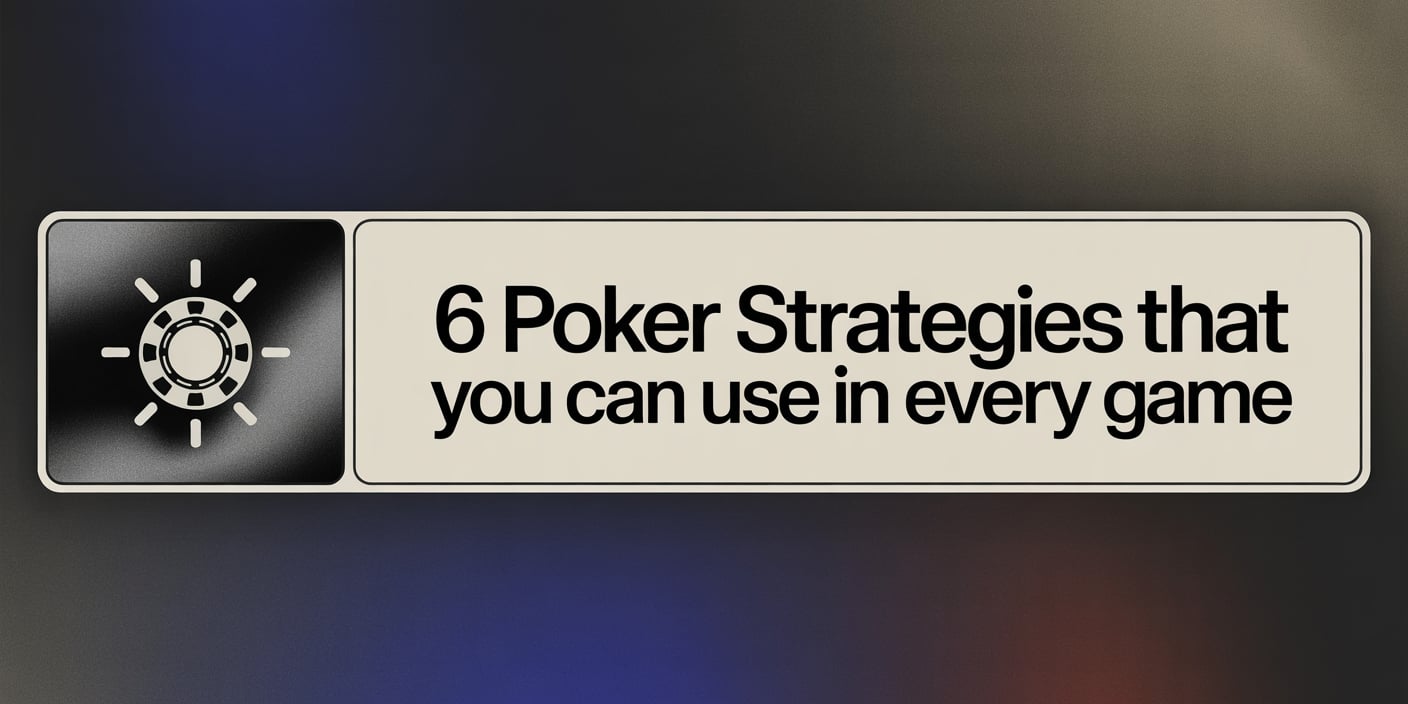6 Poker Strategies That You Can Use in Every Game

If you are playing poker against individuals rather than the house, you can use some or all of these online poker strategies to improve your play. While a few strategies work best in specific types like Hold'em, others can be used on nearly any standard variant of poker. For players who want a secure place to play, reading highly-rated Pokerraum Bewertungen can help guide you toward choosing the top sites at which to implement these strategies.
Tip 1: Play Less, Think More
The mistake of beginners is playing every hand with the expectation that it would turn out to be a winning hand. Sorry to say, this will drain your bankroll and you will accumulate more losing than winning hands. Statistically, you have higher opportunities to get a bad opening hand, and when this happens, you should understand this and fold.
As a general rule, if you don't have a good starting hand, fold early-even if you've already contributed the small or big blind. The strongest starting hands in poker are:
- Pair of Aces
- Pair of Kings
- Pair of Queens
- Pair of Jacks
- Suited Ace with King, Queen, or Jack
- Suited King and Queen
Other starting hands, such as weak pairs, are still playable although not the best. Whether to play them or not will depend on your position at the table and other factors, as discussed in the following poker tips.
Tip 2: Keep Them Guessing
Don't be predictable, i.e., to call pre-flop only with a strong starting hand and fold with a weak one. Frequency of bluffing has no fixed rule and will need to be decided on the fly. By keeping your opponents' minds active, you reduce the likelihood of them playing you instead of the cards.
Tip 3: Play the Players
If everyone at the table sees a showdown, your chances of holding the best hand are slim. Anything can go your way between pre-flop and river—a borderline suited hand may produce a flush. Well-placed aggressive raises, effectively timed bluffs, and other seemingly indifferent action can scare other players out of raising or even remaining in the hand.
Tip 4: Maximize Every Advantage
Maintaining your bankroll makes you in a position to make best use when the situation is right. If you have a quality hand, you should be able to bet it hard and keep raising. But if your hand is extremely good, avoid raising excessively and scaring others out of their hand, which limits the potential of the pot.
As in so many things in life, the best is to find the correct balance—but it is seldom simple.
Ken's Tip 5: Consider the Risks and Rewards
The quality of your hand is mostly determined by the hands your opponents hold. Your ace-high might be extremely good if the other players have worse hands. But you'll never know what others have for sure until a showdown, so you must determine your probable opponents.
Let's say that you hold a 10 and an Ace, and the flop comes 10, Queen, and 3. You have top pair and ace-high, a strong hand. But there could be another person who wins with a pair of Queens or even trip Queens. There are many things, but they have limits, so they can be calculated.
Understand how many cards are left in the deck that can potentially help your hand—termed called outs—and it will help you decide whether or not to stay in the game. Then, weigh your odds of winning against what you need to bet to stay in. Free online poker odds charts can help you calculate both and whether the prize is worth it.
Tip 6: Stay in Charge
Successful poker players may have gained a fortune, but they've also lost their fair share. The "secret," if you can call it that, is that they do stick to their bankroll and don't go chasing back losses or expecting to win every time. Good bankroll management can be used by recreational players, but professionals make it an art form.
To execute any of these poker strategies, you need a bankroll—but you need to eliminate emotion from the game as well. That's impossible if you're playing for money that you can't afford to lose. You're not going to make logical decisions either if you've blown your budget in a couple of rounds.
No matter the amount or frequency of your practice, you cannot guarantee winning. There is always an element of luck involved in any outcome for poker, so be prepared for the losses when they do occur.
If you’re feeling frustrated, it’s better to walk away with what’s left of your bankroll than keep playing and risk even more disappointment. The same goes for a winning streak—it’s easy to become overconfident and make reckless decisions based on emotion instead of reason.
Key Takeaways
- Using online poker tips can improve your overall performance, but they won’t guarantee a win.
- These poker strategies hold in Texas Hold'em, Omaha, and other player-vs.-player poker. Others don't hold when you play casino poker and bet against the house.
- Effective poker players strike a fine balance of bluffing, aggression, and folding.
- Treat your poker bankroll with care and never bet money that you can't afford to lose.








